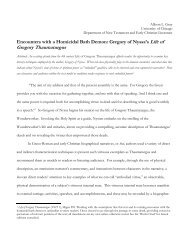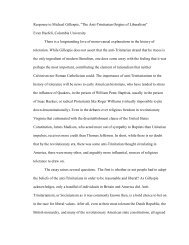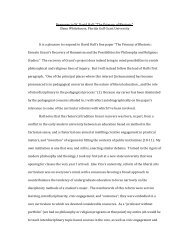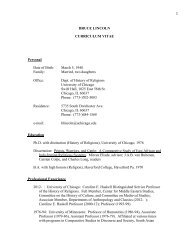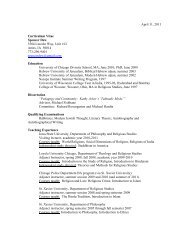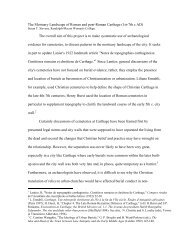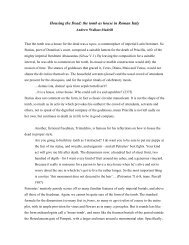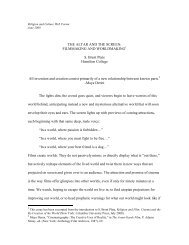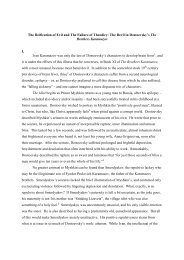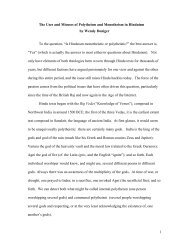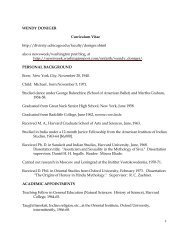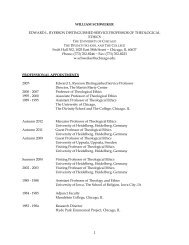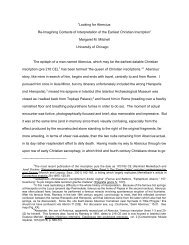*Criterion Winter 02-4.16 - Divinity School - University of Chicago
*Criterion Winter 02-4.16 - Divinity School - University of Chicago
*Criterion Winter 02-4.16 - Divinity School - University of Chicago
You also want an ePaper? Increase the reach of your titles
YUMPU automatically turns print PDFs into web optimized ePapers that Google loves.
. . . in some cases, the real trickster is not the person deceiving<br />
but the person being deceived.<br />
one person says to the other, “I don’t recognize you any<br />
more,” and no bedtrick <strong>of</strong> any kind is involved.<br />
Let me pick up on a few more themes. Pr<strong>of</strong>essor Doniger’s<br />
discussion <strong>of</strong> “Sexual Lies and Sexual Truth” is fascinating<br />
as, at least in some cases, the real trickster is not the person<br />
deceiving but the person being deceived. In The Return <strong>of</strong><br />
Martin Guerre (the film version is my reference point here<br />
although I have read Natalie Zemon<br />
Davis’s book) the trickster is not the<br />
‘fake’ Martin Guerre, played by Gerard<br />
Depardieu, who, alas, is hanged, but<br />
his wife, Bertrande, who is sexually satisfied<br />
for the first time and knows that<br />
the man in her bed is not her husband.<br />
She goes along with the trick; he suffers<br />
the consequences. In her section<br />
on the philosophy approach to all this,<br />
Pr<strong>of</strong>essor Doniger claims that bedtricks<br />
“present a challenge to our Cartesian<br />
understanding <strong>of</strong> the connection<br />
between mind and body.” In the Cartesian<br />
world there is no essential and<br />
mutually constitutive connection. The<br />
claim, <strong>of</strong> course, that “the sexual act<br />
is a source <strong>of</strong> knowledge is pr<strong>of</strong>oundly<br />
non-Cartesian,” but it is not non-many<br />
other philosophies: this is a claim that<br />
could be variously accepted by Sigmund<br />
Freud and Pope John Paul II—<br />
here I am thinking <strong>of</strong> John Paul II’s<br />
complex theology <strong>of</strong> the body and the<br />
radically anti-Cartesian argument he makes.<br />
If it is really the case that it is easy to be deceived about<br />
sex—at least we are struck by the gullibility <strong>of</strong> many <strong>of</strong> those<br />
tricked in Pr<strong>of</strong>essor Doniger’s stories—perhaps here’s the reason<br />
why: this is a gullibility that is fueled by desire. This<br />
desire is not necessarily lust in the usual sense but rather an<br />
epistemic drive, one that Freud credits. Part <strong>of</strong> what is going<br />
on in bedtricks is curiosity: a recognition that one will come<br />
to know something. Unsurprisingly, the language <strong>of</strong> having<br />
30 WINTER 20<strong>02</strong><br />
knowledge <strong>of</strong> the other—i.e., “he knew her”—is used to<br />
speak <strong>of</strong> sexual congress. All <strong>of</strong> this raises pr<strong>of</strong>ound questions<br />
about how we come to know who we are.<br />
If you are working with an account <strong>of</strong> what Charles Taylor<br />
calls “the politics <strong>of</strong> recognition”—an account <strong>of</strong> human<br />
identity that is pr<strong>of</strong>oundly social, built on the recognition,<br />
among other things, that “you can’t be different all by<br />
yourself,” as I put it in a book called<br />
Democracy on Trial, then we are not<br />
in a situation in which our knowledge<br />
<strong>of</strong> ourselves is rock-solid and<br />
secure: simply given. But our knowledge<br />
<strong>of</strong> ourselves is not just chaotic<br />
bits and pieces <strong>of</strong> contextual information<br />
either. We are rather more<br />
like a s<strong>of</strong>t but not altogether pliable<br />
material that gets chipped away at,<br />
molded, formed in our relational<br />
activities: we are neither Silly Putty<br />
nor marble, but a medium with some<br />
give. We always bring some ‘thing’<br />
to our encounters; Pr<strong>of</strong>essor Doniger<br />
argues that this includes to our beds,<br />
and that the ‘thing’ is a self. Our<br />
options are not simply between what<br />
she calls an “Enlightenment perspective”<br />
and “the Romantic notion,” but<br />
encompass a whole range <strong>of</strong> possibilities<br />
within the worlds <strong>of</strong> theology,<br />
social and political ethics, and psychology.<br />
Our needs emerge in our<br />
contexts. We want to be loved for ourselves, but what<br />
exactly is that self?<br />
Perhaps, flowing from the Romantic model and its<br />
fusion with certain social and cultural norms, we have loaded<br />
too much—way too much—on fragile human relationships.<br />
Pr<strong>of</strong>essor Doniger argues that we “desire to find a single<br />
person who loves all parts <strong>of</strong> us, who fulfills our sexual<br />
needs, family needs, intellectual needs, and so forth. But,<br />
in the traditional mode, or the paradigm <strong>of</strong> duty, some people,




